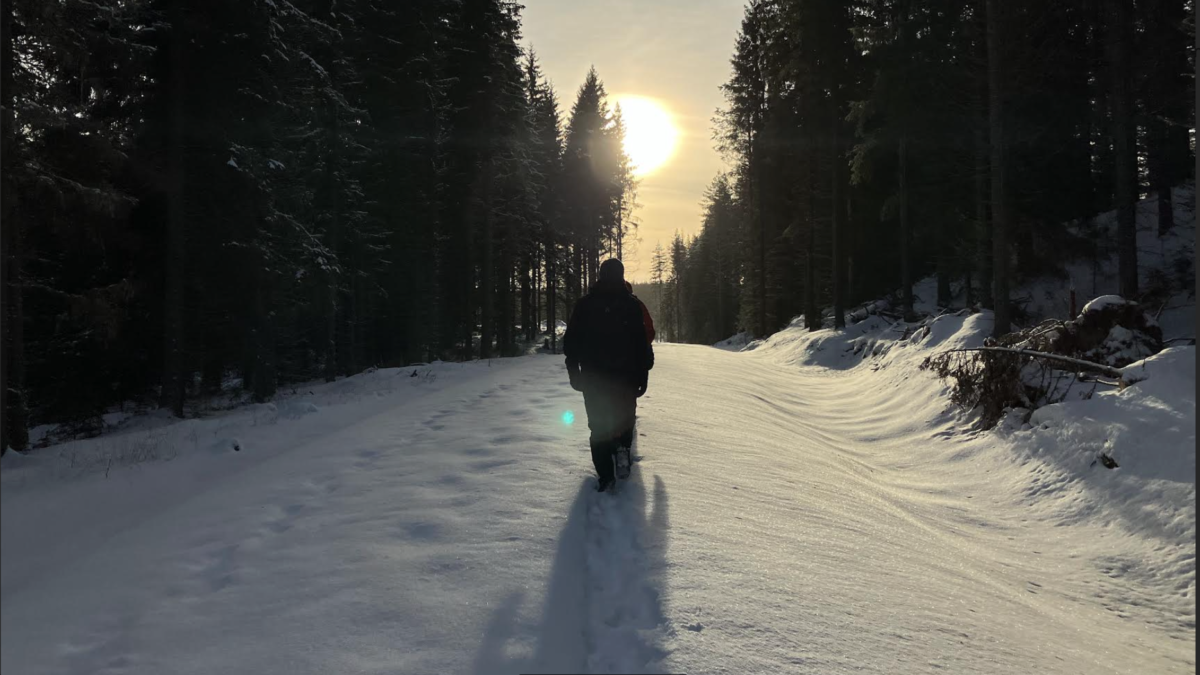Experiencing the Finnish forest: Scientists and tree-lovers
This blog reflects on the field trip of the ArsADAPT team, through the forests, rethinking the relationship between human beings and the ecological environment.

Text: Rong Yang
On the 8th of February 2023, the ArsADAPT team went to Asikkala peatland for a research field trip with scientists from the Natural Resources Institute Finland (Luke), part of the Adaptation and Resilience for Sustainable Growth (ADAPT) Strategic Research Program. Going on this trip with the heavy covering of snow was a considerable challenge. The forests were full of peace apart from the humming of the measuring machine. We saw the forests in three different forms: normal, half-cut, and whole cut, which mimic the artificial actions of humans to observe and predict the future forestry environment and also to gather the gas data to help forestry development. Forestry is one essential part of and the basement of the biodiversity-ecosystem, which plays an important role in climate change, affecting societies and people’s well-being.
A reflection on the work of the scientists
As an outsider to the field of environmental science, I can only read about the statistics or the forestry policies on a superficial level. However, for the scientists, the forest appears differently: they predict the uncertain future of the ecological systems by using the machine they constructed. They continue collecting data even in the extreme winter with heavy snow and cold, with such resilience and a hopeful heart. They measure the active life of the trees and will continue collecting this data for decades to come years. While the scientists have a deep knowledge of forestry, they cannot really take part in political decision-making regarding the future of Finnish forests. Therefore, they tell us that it is easier to exclude emotions from the field work and only focus on rational, scientific thinking. The scientists explain to us how they measure the amounts and quality of water, soil, gas, atmosphere, and carbon dioxide to understand the lifelines of the trees. Improving the sustainable future of the forests is a fundamental commitment to a better future for human beings. Nevertheless, the results of this long-lasting, meticulous work must be summarized and put on the table for the politicians who may read and decide how it works only in a few minutes, compared to the scientists who put their whole professional life into this but cannot make any political decisions of the future of the forests.
The shock of an urban megacities outsider
As someone from another country with a vast cultural gap compared to Finland, living in urban megacities for a long time, I have never experienced a relationship with the environment and human beings like this. Of course, I have read and seen reports about global warming, but I have never seen the forests. I have never smelled the soil covered with snow, listened to the peaceful sounds in the forest, or heard the humming from the tree measuring machine. Being in the research field and talking with the scientists was a wholesome multisensorial experience: I felt their love and commitment towards the trees with my body and mind. Moreover, it started making me think about my attitude toward global warming. What could I do? Especially with the global development of capitalism and consumer societies, human beings are full of selfishness and isolated from other living creatures, not to mention the natural environment. What could artists and musicians do about this?
The Sibelius Academy students and teachers participating in ArsADAPT use their professional skills, knowledge, and creativity to express the new understandings and emotions they experienced during this trip, with an attempt to integrate their work with the sustainable future agenda. As a music education researcher, I was particularly impressed by the personal stories of the scientists; their thoughts, feelings, and emotions while doing the fieldwork. Although the research results can be documented and summarized as neat statistics, the scientists – ‘tree-lovers’ – personal stories should be written and told.
Rong Yang is a doctoral researcher in the MuTri Doctoral School and Research Unit, University of the Arts Helsinki.
Music Education AMP
The purpose of this blog is to serve as an amplifier for critical statements and openings for discussion in the field of music education. The blog publishes texts in Finnish, Swedish and English. The writers are students, teachers and researchers in the music education degree programme and MuTri doctoral school.
Latest posts
-
Kultur som allemansrätt och frågan om "maktens" tillgänglighet
-
Näppäripedagogiikka - höntsäilyä ja tavoitteellista harrastamista
-
A world in change – could and should music educational thinking also change?
Follow blog